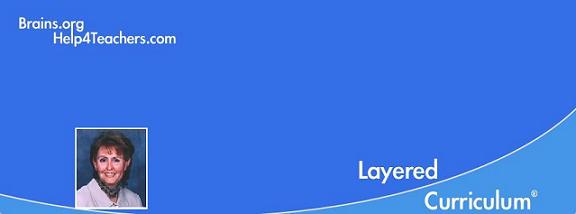__________Layered Curriculum®. . . because every child deserves a special education™_
 |
|
![]() _
_ ![]()
Layered
Curriculum TEXT & WORKBOOK
Set
for only
$43.95
(free shipping in
US)
Tweet
_Multiple Intelligences - 25 years In
© Dr Kathie Nunley, 2013What ever happened to Howard Gardner? - that mastermind who gave us his theory of "Multiple Intelligences" (MI) over 25 years ago and changed the landscape of teaching methodologies. Well, I'm here to tell you he's well and energetic and making an effort to reinsert himself into the discussion on all the applications of his theory over the past few decades.
I had the opportunity to listen to him speak this past August (2012) at the annual American Psychological Association's national convention. He had a lot of good things to say about what he's learned since originally putting out his theory.
Gardner noted that we still cling to traditional IQ tests primarily because you cannot test for Multiple Intelligences in traditional ways. It is not something that can be assessed through paper tests or self-reflection. It can only be observed in an environment that allows a student to explore. You can't simply ask students how they learn best. Becasue unless they have a strong intrapersonal intelligence, they do not have accurate knowledge of this. Multiple Intelligence assessment is always an interaction between the environment and us. Profiles change constantly based on timing and one's relationship with materials.
He also reminded teachers to learn as much about each learner as possible, present material in an intelligence-friendly way and assess progress in a variety of ways as well. Decide what is truly important and present that content in a number of ways, addressing all the relevant intelligences. Remember, if you know something well, you know it in a lot of ways.
Gardner also talked about how no two people have the same MI profile and that as we age, our intelligences become differentiated. He has strong feelings about separate education for so-called gifted children. Unless they are very gifted (more than 3 standard deviations above mean - which is about 145+IQ), all children should be educated together, not in separatist environments. Most children who are labeled as gifted have significant difficulties which can best be addressed in heterogeneous classrooms. "If you do well in language and math and science, you will do well in school. And as long as you stay in school, you will think you are very smart."
Gardner has released a new book this year Truth, Beauty, and Goodness Reframed: Educating for the Virtues in the Age of Truthiness and Twitter
to promote good work - where excellence and ethics meet.
From Howard Gardner's "Theory of Multiple Intelligences: Reflections on the first 30 Years and Speculations About Future Developments. Presented August 4, 2012 at the American Psychological Association Annual Convention, Orlando, FL.
About the Author:
Dr Kathie Nunley is an educational psychologist, researcher and author of several books on parenting and teaching, including A Student's Brain (Brains.org) and the best selling, "Differentiating the High School Classroom" (Corwin Press). She is the developer of the Layered Curriculum® method of instruction and has worked with parents and educators around the world to better structure schools to make brain-friendly environments. In addition, her work has been used by the Boeing Corporation, Family Circle Magazine, the Washington Post, and ABC television.
Email her: Kathie (at) brains.orgCopyright © 1998 - current year by Kathie F. Nunley.
All Rights Reserved.
Layered
Curriculum is a registered trademark developed by
Dr. Kathie F. Nunley.